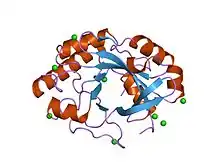Glycoside hydrolase family 25
In molecular biology, glycoside hydrolase family 25 is a family of glycoside hydrolases.
| Glycosyl hydrolases family 25 | |||||||||
|---|---|---|---|---|---|---|---|---|---|
 crystal structure of the bacterial lysozyme from streptomyces coelicolor at 1.65 a resolution | |||||||||
| Identifiers | |||||||||
| Symbol | Glyco_hydro_25 | ||||||||
| Pfam | PF01183 | ||||||||
| Pfam clan | CL0058 | ||||||||
| InterPro | IPR002053 | ||||||||
| PROSITE | PDOC00737 | ||||||||
| SCOP2 | 1jfx / SCOPe / SUPFAM | ||||||||
| CAZy | GH25 | ||||||||
| |||||||||
Glycoside hydrolases EC 3.2.1. are a widespread group of enzymes that hydrolyse the glycosidic bond between two or more carbohydrates, or between a carbohydrate and a non-carbohydrate moiety. A classification system for glycoside hydrolases, based on sequence similarity, has led to the definition of >100 different families.[1][2][3] This classification is available on the CAZy web site,[4][5] and also discussed at CAZypedia, an online encyclopedia of carbohydrate active enzymes.[6][7]
Glycoside hydrolase family 25 CAZY GH_25 comprises enzymes with only one known activity; lysozyme (EC 3.2.1.17). It has been shown[8][9] that a number of cell-wall lytic enzymes are evolutionary related and can be classified into a single family. Two residues, an aspartate and a glutamate, have been shown[10] to be important for the catalytic activity of the Charalopsis enzyme. These residues as well as some others in their vicinity are conserved in all proteins from this family.
References
- Henrissat B, Callebaut I, Fabrega S, Lehn P, Mornon JP, Davies G (July 1995). "Conserved catalytic machinery and the prediction of a common fold for several families of glycosyl hydrolases". Proceedings of the National Academy of Sciences of the United States of America. 92 (15): 7090–4. Bibcode:1995PNAS...92.7090H. doi:10.1073/pnas.92.15.7090. PMC 41477. PMID 7624375.
- Davies G, Henrissat B (September 1995). "Structures and mechanisms of glycosyl hydrolases". Structure. 3 (9): 853–9. doi:10.1016/S0969-2126(01)00220-9. PMID 8535779.
- Henrissat B, Bairoch A (June 1996). "Updating the sequence-based classification of glycosyl hydrolases". The Biochemical Journal. 316 (Pt 2): 695–6. doi:10.1042/bj3160695. PMC 1217404. PMID 8687420.
- "Home". CAZy.org. Retrieved 2018-03-06.
- Lombard V, Golaconda Ramulu H, Drula E, Coutinho PM, Henrissat B (January 2014). "The carbohydrate-active enzymes database (CAZy) in 2013". Nucleic Acids Research. 42 (Database issue): D490-5. doi:10.1093/nar/gkt1178. PMC 3965031. PMID 24270786.
- "Glycoside Hydrolase Family 25". CAZypedia.org. Retrieved 2018-03-06.
- CAZypedia Consortium (December 2018). "Ten years of CAZypedia: a living encyclopedia of carbohydrate-active enzymes" (PDF). Glycobiology. 28 (1): 3–8. doi:10.1093/glycob/cwx089. PMID 29040563.
- Henrissat B (December 1991). "A classification of glycosyl hydrolases based on amino acid sequence similarities". The Biochemical Journal. 280 (2): 309–16. doi:10.1042/bj2800309. PMC 1130547. PMID 1747104.
- Croux C, García JL (July 1991). "Sequence of the lyc gene encoding the autolytic lysozyme of Clostridium acetobutylicum ATCC824: comparison with other lytic enzymes". Gene. 104 (1): 25–31. doi:10.1016/0378-1119(91)90460-S. PMID 1916274.
- Fouche PB, Hash JH (October 1978). "The N,O-diacetylmuramidase of Chalaropsis species. Identificaiton of aspartyl and glutamyl residues in the active site". The Journal of Biological Chemistry. 253 (19): 6787–93. doi:10.1016/S0021-9258(17)37988-7. PMID 567645.